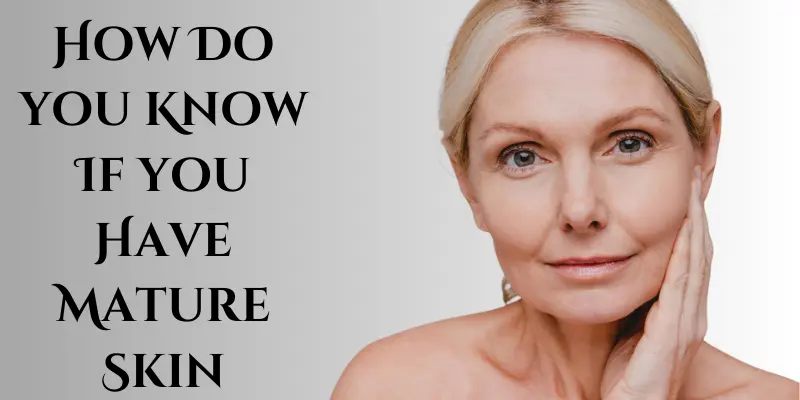What Is Mature Skin? Causes, Effects & Skincare Solutions
Published: 7 Feb 2025
Welcome, lovely reader!
I’m so glad you’re here. You’ve just landed in the right place if you care about your skin and want to understand how it changes with time. Before we dive in, I invite you to check out our previous blog on What Is Sallow Skin. In that post, we talked about dull and tired-looking skin, something many of us struggle with. If you’ve ever looked in the mirror and wondered why your skin looks different or feels off, that blog will help you a lot.
Now, in this guide, we’ll talk about something just as important—what is mature skin. You might have noticed changes like dryness, fine lines, or less glow. Don’t worry, you’re not alone. Just like I explained “what is sallow skin” before, today I’ll walk you through what mature skin really means, what causes it, and how you can care for it with love and confidence. Let’s get into it!
How Do I Know If I Have Mature Skin

If you’re noticing changes in your skin that weren’t there before, you might have mature skin. It’s a normal part of aging, and it can happen gradually over time. Your skin might look different, feel different, or show signs that it’s not as firm or smooth as it once was. So, how can you tell if you have mature skin? Let’s break it down.
Signs of Mature Skin
When your skin starts showing signs of aging, it’s usually because your skin is losing moisture, collagen, and elasticity. Here are some common signs to look out for:
- Fine lines and wrinkles: These often show up around your eyes, mouth, and forehead as your skin loses its firmness.
- Dryness: If your skin feels dry or tight more often, it could be a sign that it’s not retaining moisture as well as it used to.
- Loss of elasticity: Skin that doesn’t bounce back after pinching or stretching may have lost some of its youthful elasticity.
- Age spots and uneven skin tone: Dark spots or redness can appear as you get older, especially from sun exposure.
- Thinner skin: Mature skin may become thinner, making it more fragile and sensitive to harsh weather or skincare products.
- Dullness: As the skin’s natural cell turnover slows down, you might notice that your complexion looks less bright or vibrant than before.
If you see any of these signs, your skin is likely maturing. But don’t worry it’s completely natural, and you can still take steps to care for it!
What Causes Mature Skin?
As we age, our skin goes through natural changes that can make it look and feel different. These changes happen because our skin produces less collagen, loses moisture, and doesn’t renew itself as quickly. While aging is a natural process, other factors like sun exposure, pollution, and lifestyle habits can make the process happen faster.
Natural Aging Process
The natural aging process affects your skin over time. Collagen and elastin, two important proteins that keep the skin firm and smooth, slow down as we get older. This leads to sagging and wrinkles. Additionally, the skin’s ability to renew itself slows down, causing your complexion to look dull.
- Collagen and elastin production slows: This leads to sagging and wrinkles.
- Cell turnover decreases: Skin takes longer to renew, which can leave it looking dull.
External Factors
Several external factors also affect how your skin ages. These include sun damage, pollution, and lifestyle choices. These elements can speed up the aging process and cause other skin issues like dryness and dark spots.
- Sun damage: UV rays break down collagen, causing wrinkles and age spots.
- Pollution: Free radicals from pollution damage skin cells, leading to faster aging.
- Lifestyle habits: Smoking, poor diet, and lack of sleep all affect your skin’s health, making it age more quickly.
Hormonal Changes
As we go through different stages in life, especially during menopause or other hormonal changes, the skin produces less oil. This can lead to dryness and a loss of moisture, making the skin feel rough and less hydrated.
- Reduced oil production: Hormonal changes reduce natural oil production, leading to dryness and dullness.
Understanding these causes can help you take better care of your skin and manage the signs of aging effectively.
Skincare Solutions for Mature Skin
Taking care of mature skin is important to maintain its health and radiance. There are several key ingredients and steps you can use to keep your skin hydrated, firm, and glowing. Let’s take a look at what you should include in your skincare routine.
Key Ingredients to Look For
Certain ingredients can work wonders on mature skin by addressing common issues like wrinkles, dryness, and loss of firmness. Here’s a breakdown of some ingredients to look out for:
- Retinol: Helps reduce wrinkles, boosts collagen production, and improves skin texture.
- Hyaluronic Acid: Hydrates the skin and adds volume, helping to reduce dryness.
- Vitamin C: Brightens the skin, reduces dark spots, and provides protection from free radicals.
- Peptides: Support skin repair, helping firm the skin and reduce sagging.
- Antioxidants: Protect the skin from environmental damage, keeping it healthy and youthful.
Daily Skincare Routine
A regular skincare routine is essential for mature skin. Here are the steps to follow for healthy, glowing skin:
- Cleansing: Start with a gentle cleanser to remove dirt and impurities. Choose one like Cica Redness Relief Nourishing Cleanser for a soothing effect.
- Exfoliation: Exfoliate 2-3 times a week to remove dead skin cells and reveal smoother skin. Daily Glow Exfoliant Boosting Toner is a great choice.
- Moisturizing: Use a rich moisturizer with peptides or ceramides, such as Matriplex™ Peptide Intense Cream, to keep your skin hydrated and plump.
- Sun Protection: Apply SPF 30+ every day to protect your skin from further sun damage and prevent premature aging.
Targeted Treatments
For extra care, you can use treatments designed for specific skin concerns:
- Eye Creams: Help reduce puffiness and fine lines around the eyes, like Peptide Complex Wrinkle Defense Eye Cream.
- Serums: Provide an extra boost of hydration and skin repair. Try Power C Antioxidant Radiance Boosting Serum for a brighter, smoother complexion.
- Night Creams: Focus on repair overnight with an anti-aging night cream, such as Anti-Aging Retinol Night Cream, for deep nourishment and skin renewal.
Professional Treatments
Sometimes, professional treatments can provide an additional boost to your skincare routine:
- Facials: Deep cleansing and hydration for your skin, leaving it refreshed.
- Chemical Peels: Help remove dead skin cells and improve skin texture, giving your face a smoother appearance.
- Laser Treatments: Stimulate collagen production, helping reduce wrinkles and improve skin tone.
Using these skincare solutions regularly can help keep your mature skin looking youthful, hydrated, and radiant!
FAQs
Q1: What is the best foundation for mature skin?
The best foundation for mature skin is one that provides hydration and doesn’t settle into fine lines. Look for foundations with a dewy finish and ingredients like hyaluronic acid. These foundations help maintain a fresh, smooth appearance throughout the day.
Q2: What is the best makeup for mature skin?
For mature skin, choose makeup that is hydrating and lightweight. Look for formulas with ingredients like Vitamin C or hyaluronic acid to keep your skin nourished. Avoid heavy powders, and go for creamy products that blend easily and don’t settle into wrinkles.
Q3: What is the best primer for mature skin?
The best primer for mature skin smooths fine lines and provides hydration. Look for primers with peptides or silicone to create a smooth base for makeup. A hydrating primer is ideal to keep your makeup looking fresh without settling into wrinkles.
Q4: What is not a beneficial treatment for mature skin?
Treatments that are too harsh, like strong chemical peels or abrasive scrubs, can irritate mature skin. Avoid aggressive exfoliation and overuse of retinol without moisturizing. It’s better to choose gentle, nourishing treatments that help maintain the skin’s natural balance.
Q5: What is the best self-tanner for mature skin?
For mature skin, choose a self-tanner that’s moisturizing and gradual. Look for self-tanners with hydrating ingredients like aloe vera or vitamin E. A tinted lotion can give a natural, even tan without streaks, and it won’t dry out the skin.
Conclusion
So, in this article, we’ve discussed What Is Mature Skin? and the natural changes that come with aging, such as collagen loss, sun damage, and lifestyle factors. The signs of mature skin, including wrinkles, dryness, dullness, and loss of firmness, can be managed with the right skincare routine. By using key ingredients like retinol, hyaluronic acid, and antioxidants, and considering professional treatments, you can address these changes and keep your skin healthy and glowing.
Remember, mature skin doesn’t mean unhealthy skin, it can still look vibrant and radiant with the proper care. Start your simple skincare routine today, and don’t hesitate to consult a dermatologist for personalized guidance if needed. Your skin can continue to look its best at any age with the right attention.

- Be Respectful
- Stay Relevant
- Stay Positive
- True Feedback
- Encourage Discussion
- Avoid Spamming
- No Fake News
- Don't Copy-Paste
- No Personal Attacks

- Be Respectful
- Stay Relevant
- Stay Positive
- True Feedback
- Encourage Discussion
- Avoid Spamming
- No Fake News
- Don't Copy-Paste
- No Personal Attacks






